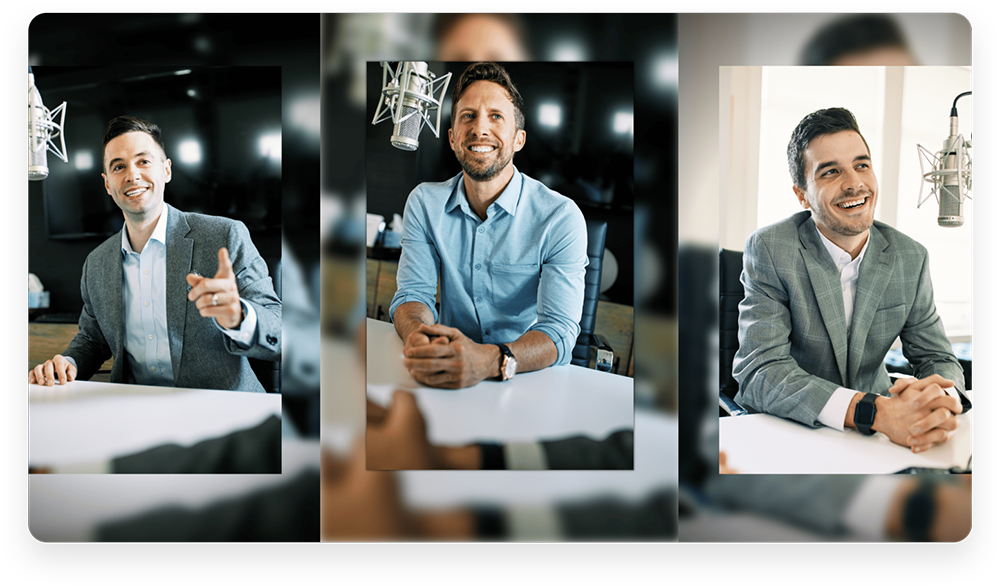Retire While You Work® Podcast
Join us as we discuss various topics to help you find the path to viewing money as a means to the true currency, TIME, and learn how to build more memories and experiences.
View All EpisodesJoin us as we discuss various topics to help you find the path to viewing money as a means to the true currency, TIME, and learn how to build more memories and experiences.
View All Episodes
What if you could do what you're passionate about and achieve a work-life balance? What if you were relieved of the pressure to have some massive amount saved?
Learn More
“Retirement wellness is about more than having enough money. It’s a lifestyle and mindset change that focuses not just on money and resources, but also creating memories and experiences. Balance is critical to enjoy this next chapter.” -David Adams
We know you look to us for more than just financial guidance — especially as you plan for the major life changes ahead. Retirement, for example, isn’t just about putting your money in the right pots; it represents a milestone, a whole new lifestyle. And you want to feel prepared for not only the bills but also the health challenges, shifting sense of purpose, and new social dynamics as you leave the workplace behind.
Financial wellness is intertwined with the many other areas of your life, and we want to help you live well on every level. That’s why we created a retirement plan that looks at the big picture.
Many of you know my father’s story that I wrote about in my new book, “The Currency of Time” (available on Amazon or in our office). His story lead me to create a new concept and way of thinking about money called “Retire While You Work.” Below is one of many ways to think about money, time, and life, and I hope you will visit our blog for more articles on this topic.
Here are the Five Elements of Retirement Wellness we believe will make a difference as you begin this new, exciting chapter.
Financial Structure
Before you retire, it’s essential to have a strong financial foundation. This means getting and keeping the right job, opening accounts within the mainstream financial system, building an appropriate emergency fund, and keeping debt under control[1].
Once you’ve established a healthy foundation, you can begin to think about retirement. For this next financial phase of your life, you’ll need enough money and resources to cover at least two decades, while maintaining the kind of lifestyle that makes you feel safe, well cared for, and happy. You’ll also may need a system, or a plan, to help you manage your money, so your resources are spent gradually over an extended period of time.
Purpose
Pursuing your purpose and passion is what gives meaning to life. You’ve worked hard throughout your professional career because, one day, you want to be able to focus on your passions entirely. In retirement, you’ll have more time to revel in life’s beauty and meaning. Whatever it is that brings you to life — family, friends, travel, sports, volunteering, creative endeavors — is exactly how you should be spending your days.
Social
One of the best ways to bring meaning and joy into your day is to spend time with the people you cherish. It’s essential to maintain your relationships, and even broaden your network, in retirement. These connections will help you continue a path of personal growth and development; they’ll keep you from feeling like you’re slowing down too much. Engaging with different generations helps you maintain a sense of belonging in a world that’s quickly changing.
Physical Well-being
Not only does your health affect your wallet, but it also plays a factor in deciding what you can enjoy and for how long. Many people hope to travel in retirement, for example, but that means you also must maintain your physical health well enough to be able to do so with ease and vitality. Getting enough sleep, eating well, exercising often and avoiding risky behaviors — such as smoking or drinking in excess — will help you get the most out of your retirement.
Community
Lastly, the community you call home can have a significant impact on your ability to enjoy the later years of life. Local transportation, crime rates and accessibility will play a role in your ability to accomplish day-to-day tasks and engage with people. Housing is also a major factor. Your home should be adequately prepared for aging in place, if that’s your goal, and your housing situation should support your life activities and personal needs.
Sources
Any opinions are those of the financial advisor and not necessarily those of Raymond James. The information is not a complete summary or statement of all available data necessary for making an investment decision, and does not constitute a recommendation. The information has been obtained from sources considered to be reliable, but we do not guarantee that the foregoing material is accurate or complete. All investing involves risk and you may incur a profit or a loss. There is no assurance that any investment strategy will be successful. Asset allocation and diversification does not ensure a profit or protect against a loss.


Adams Wealth Partners, LLC is not a registered broker/dealer and is independent of Raymond James Financial Services. Investment advisory services offered through Raymond James Financial Services Advisors, Inc. Securities offered through Raymond James Financial Services, Inc., member FINRA/SIPC
Neither Raymond James Financial Services nor any Raymond James Financial Advisor renders advice on tax issues, these matters should be discussed with the appropriate professional.
Links are being provided for information purposes only. Raymond James is not affiliated with and does not endorse, authorize, or sponsor any of the listed websites or their respective sponsors. Raymond James is not responsible for the content of any website or the collection or use of information regarding any website's users and/or members.
The running stock ticker is not a recommendation to buy or sell stocks of the companies pictured.

Securities offered through Raymond James Financial Services, Inc., member FINRA/SIPC, marketed as Adams Wealth Partners. Investment advisory services offered through Raymond James Financial Services Advisors, Inc.Adams Wealth Partners is separately owned and operated and not independently registered as a broker-dealer or investment adviser.
Certified Financial Planner Board of Standards Inc. owns the certification marks CFP®, CERTIFIED FINANCIAL PLANNER™, CFP® (with plaque design) and CFP® (with flame design) in the U.S., which it awards to individuals who successfully complete CFP Board's initial and ongoing certification requirements. CFP® holders at Adams Wealth Partners, LLC are: David Adams, Myles Zueger, Carson Odom, and Spencer Provow
CPA holders at Adams Wealth Partners, LLC are: David Adams, Carson Odom, and Christine Kinsley
Please note that all archived content is for informational purposes only. Investment decisions should not be based on the content provided herein. For the most up-to- date statistical information and analysis, please contact your financial professional.
Raymond James financial advisors may only conduct business with residents of the states and/or jurisdictions for which they are properly registered. Therefore, a response to a request for information may be delayed. Please note that not all of the investments and services mentioned are available in every state. Investors outside of the United States are subject to securities and tax regulations within their applicable jurisdictions that are not addressed on this site. Contact your local Raymond James office for information and availability.

The 2024 Forbes ranking of America’s Top Wealth Management Teams Best-In-State, developed by SHOOK Research, is based on an algorithm of qualitative criteria, mostly gained through telephone and in-person due diligence interviews, and quantitative data. This ranking is based upon the period from 3/31/2022 to 3/31/2023 and was released on 01/09/2024. Advisor teams that are considered must have one advisor with a minimum of seven years of experience, have been in existence as a team for at least one year, have at least 5 team members, and have been nominated by their firm. The algorithm weights factors like revenue trends, assets under management, compliance records, industry experience and those that encompass best practices in their practices and approach to working with clients. Portfolio performance is not a criteria due to varying client objectives and lack of audited data. Out of approximately 10,100 team nominations, 4,100 advisor teams received the award based on thresholds. This ranking is not indicative of an advisor's future performance, is not an endorsement, and may not be representative of individual clients' experience. Neither Raymond James nor any of its Financial Advisors or RIA firms pay a fee in exchange for this award/rating. Raymond James is not affiliated with Forbes or Shook Research, LLC. Please see https://www.forbes.com/lists/wealth-management-teams-best-in-state/ for more info.
Barron’s Top 1,200 Financial Advisors 2023, is based on the period from 09/30/2021 - 09/30/2022 and was released on 03/15/2023. 5630 nominations were received and 1,200 won. Neither Raymond James nor any of its advisors pay a fee in exchange for this award. More:https://www.raymondjames.com/award-disclosures/#2023-barrons-top-1200
Please note that all archived content is for informational purposes only. Investment decisions should not be based on the content provided herein. For the most up-to- date statistical information and analysis, please contact your financial professional.
Raymond James is not affiliation and does not endorse the above-mentioned organizations.
Nashville Wealth Management & Financial Advisors | David Adams CPA, CFP® | Copyright © 2024 | Privacy Notice | Legal Disclosure
